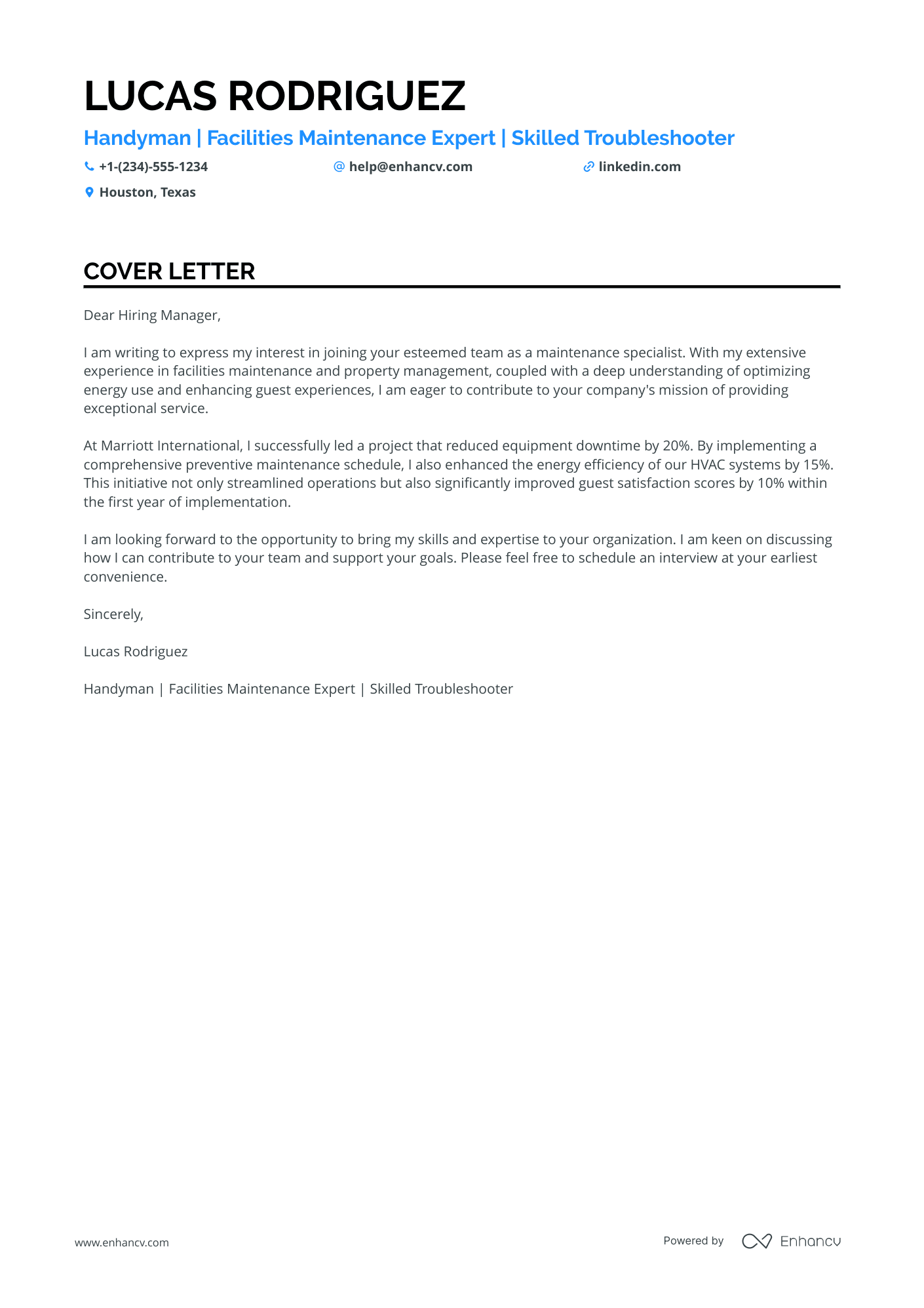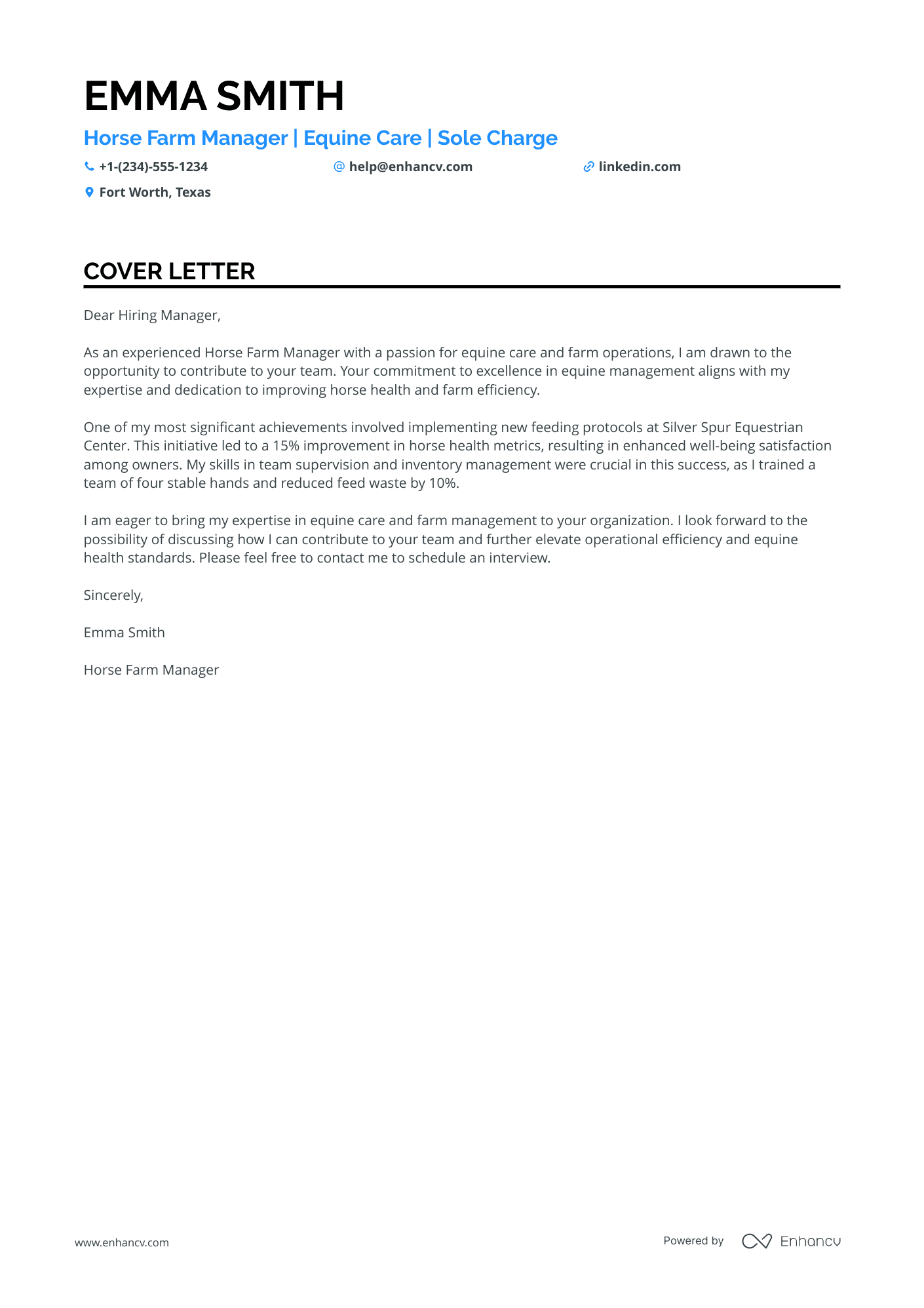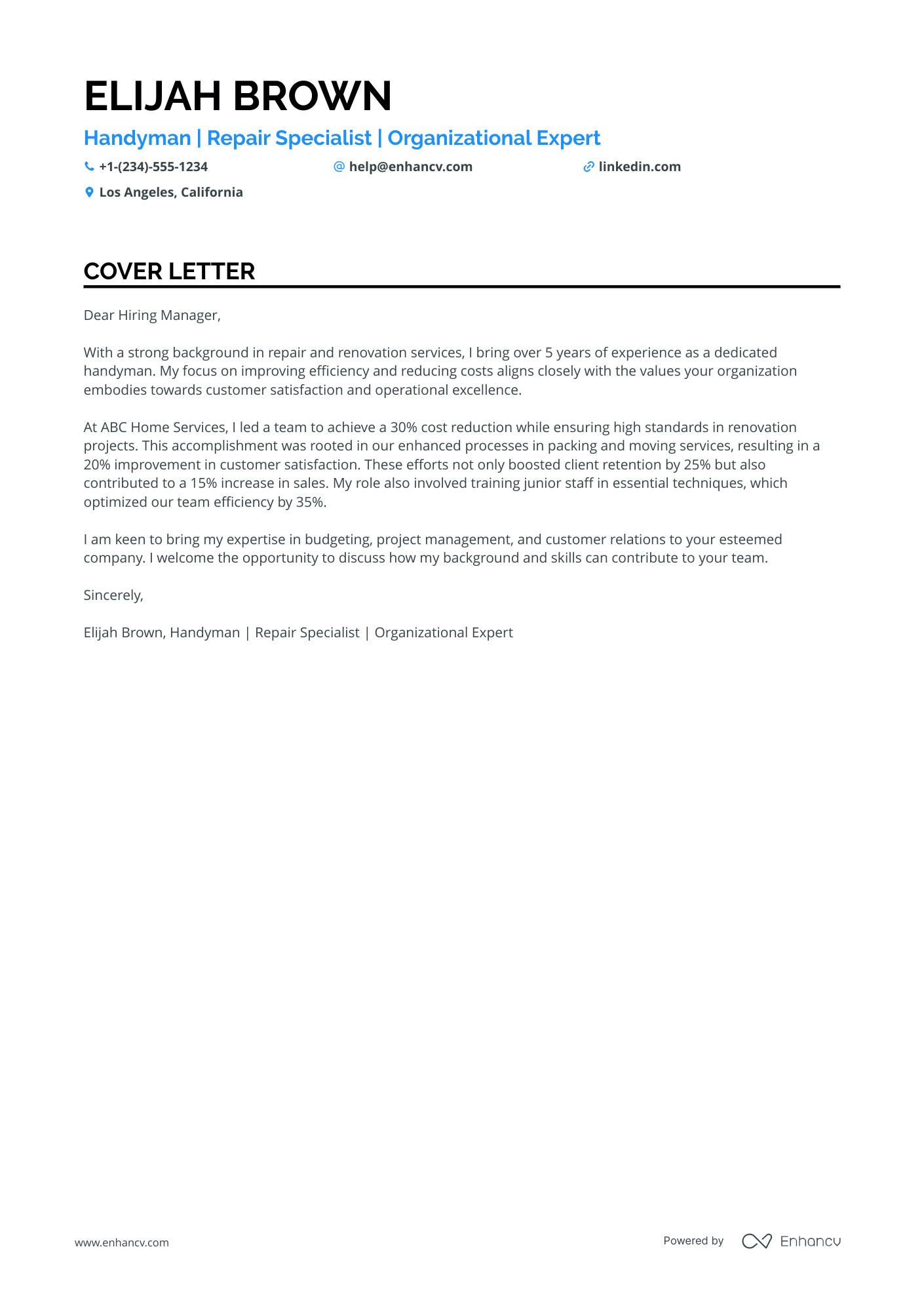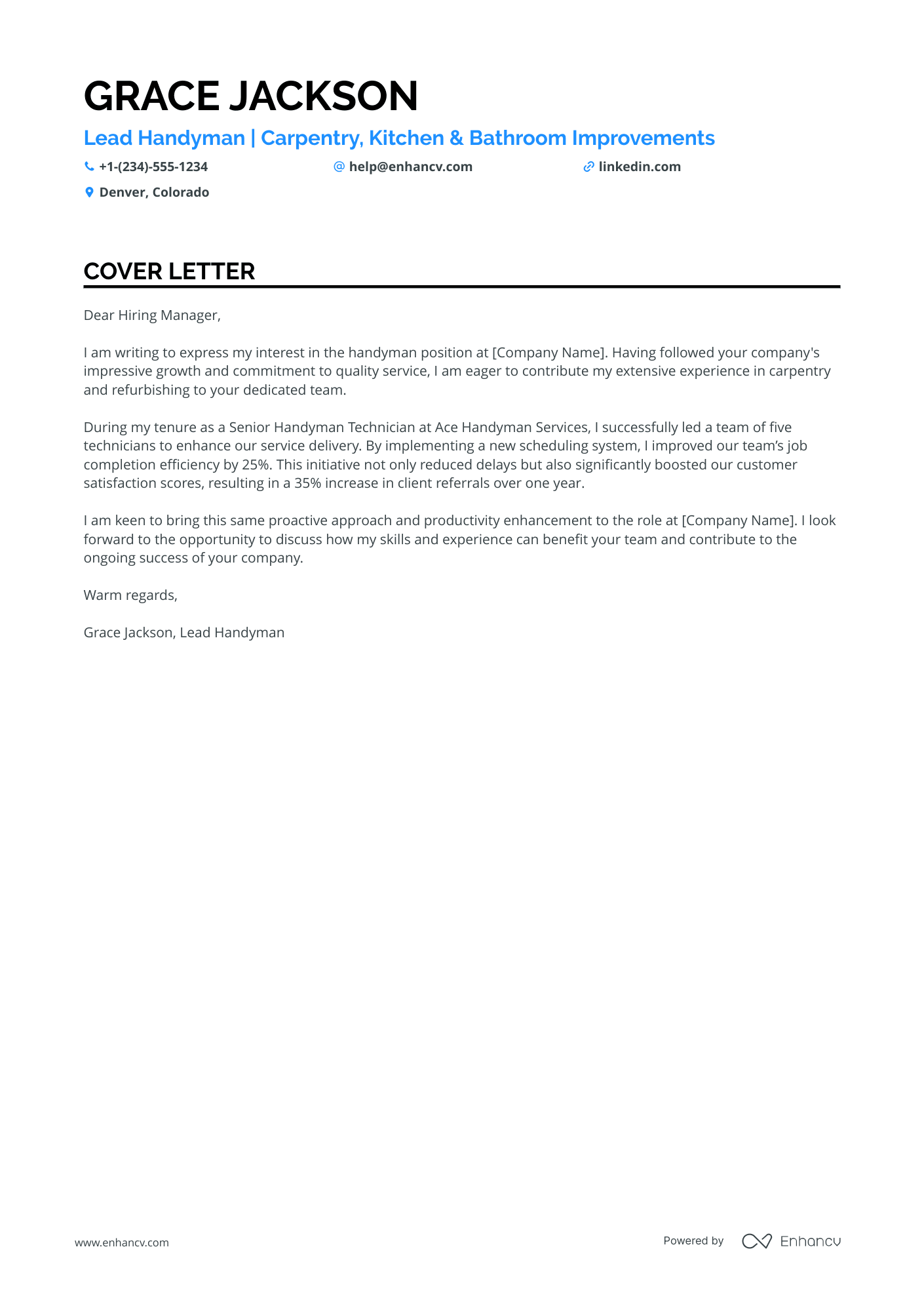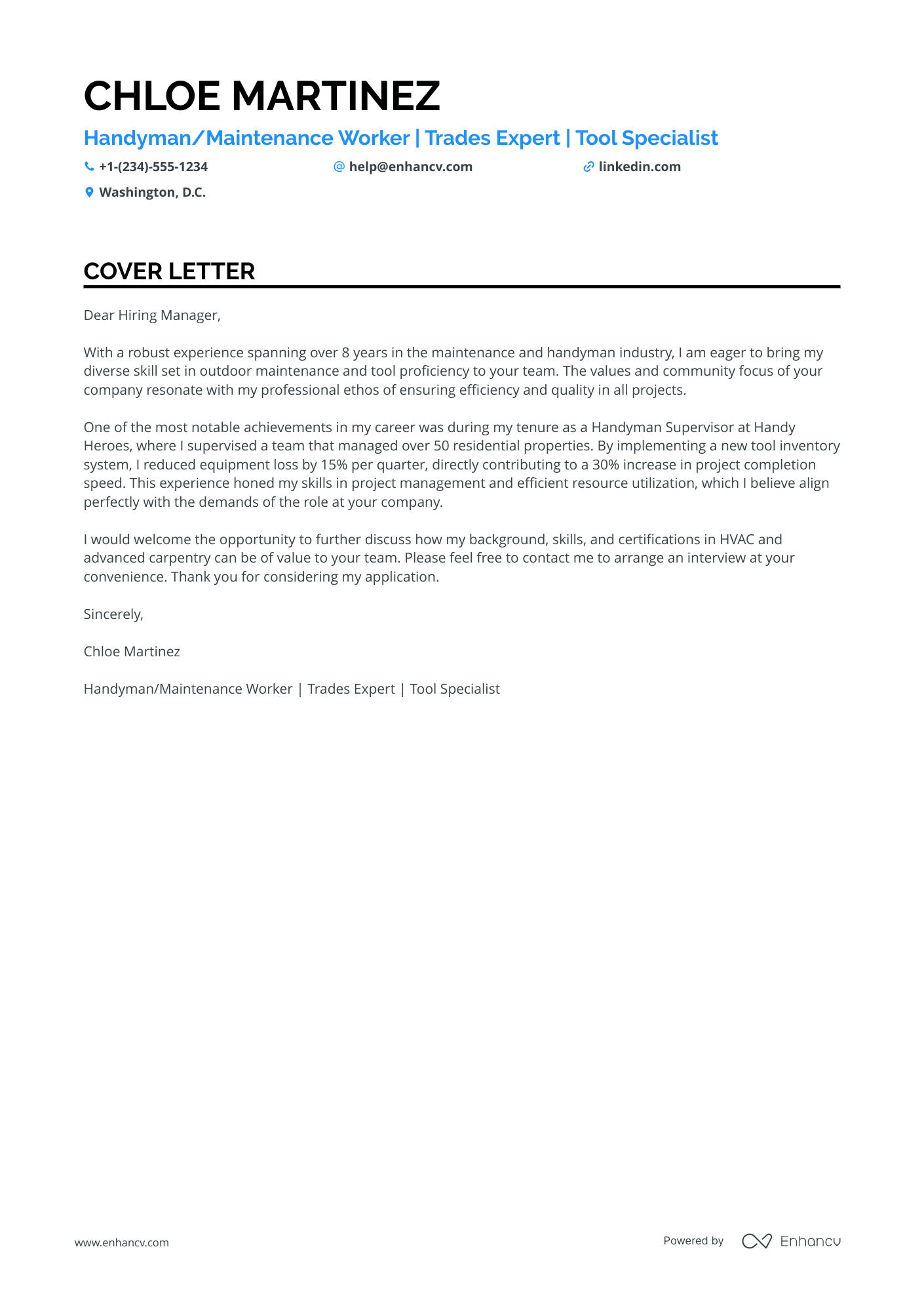Starting your job search as a handyman, you've probably realized that a standout cover letter is not just a suggestion—it's a necessity. Often, the hurdle isn't crafting a lengthy resume; it's condensing your proudest professional accomplishment into a single, non-repetitive page that tells your story without resorting to clichés. This brief yet impactful letter should be both formal and personal, giving potential employers a glimpse of your skills beyond what's listed on your resume. Let's tackle the art of composing a cover letter that's as precise and effective as the work you do.
- Personalize your handyman cover letter and get inspired by other professionals to tell a compelling story;
- Format and design your handyman cover letter to make an excellent first impression;
- Introduce your best achievement in your handyman cover letter to recruiters;
- How to make sure recruiters get in touch with you, using your handyman cover letter greeting and closing paragraphs.
What is more, did you know that Enhancv's AI can write your cover letter for you? Just upload your handyman resume and get ready to forward your job application in a flash.
If the handyman isn't exactly the one you're looking for we have a plethora of cover letter examples for jobs like this one:
- Handyman resume guide and example
- Regional Property Manager cover letter example
- Hospital Housekeeping cover letter example
- Electrician Apprentice cover letter example
- Appartment Maintenance Technician cover letter example
- Homemaker cover letter example
- Mechanic cover letter example
- Janitor cover letter example
- Custodian cover letter example
- Journeyman Electrician cover letter example
- Resident Assistant cover letter example
Drop your resume here or choose a file.
PDF & DOCX only. Max 2MB file size.
Handyman cover letter example
MADISON TAYLOR
Washington, D.C.
+1-(234)-555-1234
help@enhancv.com
- Highlighting specific project achievements: The cover letter emphasizes the revitalization project for HVAC systems, demonstrating the candidate's ability to manage substantial, impactful projects—key for a maintenance role.
- Demonstrating quantifiable results: Mentioning the 15% reduction in energy costs and the enhancement of system efficiency by 30% shows the candidate's focus on delivering measurable outcomes, a compelling trait for a prospective employer.
- Incorporating cost-saving strategies: By noting the procurement of materials at 20% lower costs, the cover letter showcases the candidate's negotiation skills and fiscal responsibility, both of which are valuable in a maintenance position where budget management is crucial.
- Expressing a dedication to tenant satisfaction: The cover letter makes a clear connection between maintenance work and the improvement of tenant living standards, indicating a customer-centric approach, which is essential in property management roles.
Structuring and formatting your handyman cover letter
Here's what the structure of your handyman cover letter should include:
- Header (with your name, the position you're applying for, and the date);
- Salutation (or greeting);
- Introductory paragraph (or your opening statement);
- Body paragraph (or further proof of your experience);
- Closing paragraph (with a call to action);
- Signature (that is optional).
Use the same font for your handyman resume and cover letter - modern fonts like Lato and Rubik would help you stand out.
Your handyman cover letter should be single-spaced and have a one-inch margins - this format is automatically set up in our cover letter templates and our cover letter builder.
When submitting your cover letter, always ensure it's in PDF, as this format keeps the information intact (and the quality of your document stays the same).
On one final note - the Applicant Tracker System (ATS or the software that is sometimes used to initially assess your application) won't read your handyman cover letter.
Don’t stress about writing your cover letter. Use our free cover letter generator to make one in seconds.
The top sections on a handyman cover letter
- Header with Contact Information: Include your full name, phone number, and email address so the recruiter can easily reach you for an interview or further discussion about your handyman skills and experience.
- Greeting: Address the cover letter to the specific hiring manager or company owner if known, to show attention to detail and personalization, which reflects the care you will bring to your handyman duties.
- Introduction: Briefly introduce yourself, stating your experience as a handyman, and express your enthusiasm for the specific opportunity, highlighting your knowledge of the company’s needs or reputation.
- Professional Experience and Skill Highlights: Use this section to detail specific handyman skills such as carpentry, plumbing, electrical, or other repair work, and include examples of past jobs where you successfully utilized these skills, showing relevance to the tasks expected in the job you're applying for.
- Closing and Call to Action: End the letter by summarizing your suitability for the role, expressing eagerness to discuss the job further in an interview, and thanking the recruiter for considering your application, which demonstrates professionalism and eagerness to engage.
Key qualities recruiters search for in a candidate’s cover letter
- Proficiency in a wide range of repair and maintenance tasks: Recruiters look for handymen who can demonstrate expertise in various domains such as plumbing, electrical work, carpentry, painting, and more. This versatility is crucial because a handyman must handle diverse requests from clients.
- Strong problem-solving skills: Handymen often encounter unexpected issues during their work. Recruiters value candidates who can quickly assess a situation, identify the problem, and implement a practical solution.
- Experience with tools and equipment: A good handyman should be familiar with the tools of the trade, from basic hand tools to power tools and specialized equipment. Knowledge of proper tool use and safety is essential.
- Customer service orientation: Excellent interpersonal and communication skills are vital as handymen interact directly with clients, listening to their needs, explaining technical details, and ensuring customer satisfaction.
- Attention to detail: Quality craftsmanship is critical in handyman work. Recruiters look for candidates who pay attention to detail and take pride in delivering high-quality, precise work.
- Reliability and time management: Handymen should be able to manage their schedule effectively and complete tasks within set deadlines. Recruiters seek candidates who are dependable, punctual, and can be trusted to work independently.
How to address hiring managers in your handyman cover letter greeting
Goodbye, "Dear Sir/Madam" or "To whom it may concern!"
The salutation of your handyman cover letter is how you kick off your professional communication with the hiring managers.
And you want it to start off a bit more personalized and tailored, to catch the recruiters' attention.
Take the time to find out who's recruiting for the role (via LinkedIn or the company page).
If you have previously chatted or emailed the hiring managers, address them on a first or last name basis.
The alternative is a "Dear HR team" or "Dear Hiring Manger", but remember that a "Dear Ms. Simmons" or "Dear Simon," could get you farther ahead than an impersonal greeting.
List of salutations you can use
- Dear Hiring Manager,
- Dear [Company Name] Team,
- Dear [Specific Department] Manager,
- Dear Mr./Ms. [Last Name],
- Dear [Job Title] Search Committee,
- Dear [First Name] [Last Name],
Your handyman cover letter intro: showing your interest in the role
On to the actual content of your handyman cover letter and the introductory paragraph.
The intro should be no more than two sentences long and presents you in the best light possible.
Use your handyman cover letter introduction to prove exactly what interests you in the role or organization. Is it the:
- Company culture;
- Growth opportunities;
- Projects and awards the team worked on/won in the past year;
- Specific technologies the department uses.
When writing your handyman cover letter intro, be precise and sound enthusiastic about the role.
Your introduction should hint to recruiters that you're excited about the opportunity and that you possess an array of soft skills, e.g. motivation, determination, work ethic, etc.
What to write in the middle or body of your handyman cover letter
Here's where it gets tricky.
Your handyman cover letter body should present you in the best light possible and, at the same time, differ from your resume.
Don't be stuck in making up new things or copy-pasting from your resume. Instead, select just one achievement from your experience.
Use it to succinctly tell a story of the job-crucial skills and knowledge this taught you.
Your handyman cover letter is the magic card you need to further show how any organization or team would benefit from working with you.
Finishing off your handyman cover letter with what matters most
So far, you've done a fantastic job in tailoring your handyman cover letter for the role and recruiter.
Your final opportunity to make a good impression is your closing paragraph.
And, no, a "Sincerely yours" just won't do, as it sounds too vague and impersonal.
End your handyman cover letter with the future in mind.
So, if you get this opportunity, what do you plan to achieve? Be as specific, as possible, of what value you'd bring to the organization.
You could also thank recruiters for their interest in your profile and prompt for follow-up actions (and organizing your first interview).
Is it beneficial to mention that you have no experience in your handyman cover letter?
Lacking professional experience isn't the end of the world for your handyman cover letter.
Just be honest that you may not have had roles in the industry, but bring about so much more.
Like, your transferable skills, attained thanks to your whole work and life experience (e.g. the skills your summer spent working abroad taught you).
Or, focus on what makes you, you, and that one past success that can help you stand out and impress recruiters (think of awards you've attained and how they've helped you become a better professional).
Alternatively, write about your passion and drive to land the job and the unique skill set you would bring to enhance the workplace culture.
Key takeaways
Creating your handyman cover letter should be a personalized experience for the role and the recruiter, where you:
- Format your cover letter using the same ATS-friendly font (e.g. Railway) as you did for your resume;
- Greet recruiters, using their name, and follow up with two sentences to introduce yourself, your interest in the role, and to stand out;
- Map out one key success from your career (or life) that has taught you job-crucial skills;
- Substitute your lack of experience with an achievement from your internships, degrees, or volunteering gigs;
- End with a promise for your potential or your availability for an interview.
Handyman cover letter examples
By Experience
Senior Handyman
- Highlighting specific experience in facilities maintenance and property management to demonstrate relevant expertise.
- Emphasizing successful projects that had a measurable impact, such as reducing equipment downtime and improving energy efficiency.
- Mentioning improved guest satisfaction scores to showcase the ability to enhance customer experiences, a critical factor in hospitality roles.
- Offering to discuss contributions and align skills with company goals, positioning the applicant as proactive and eager to integrate into the team.
Junior Handyman
- Highlighting specific achievements: The letter mentions implementing new feeding protocols that led to a measurable improvement in horse health metrics, demonstrating the candidate's capability to bring about positive changes.
- Quantifying success: By providing specific statistics, such as a 15% improvement in health metrics and a 10% reduction in feed waste, the candidate effectively communicates their impact and efficiency.
- Combining leadership and technical skills: The mention of training a team and managing inventory showcases a blend of management and technical skills essential for the role of a Horse Farm Manager.
Handyman Apprentice
- Highlights relevant experience: The cover letter effectively emphasizes over 5 years of experience as a handyman, establishing credibility in the field right from the start.
- Quantifies achievements: It uses specific figures, such as a 30% cost reduction and a 25% increase in client retention, to showcase measurable success in previous roles.
- Demonstrates leadership skills: Mentions leading a team and training junior staff, which highlights the applicant's leadership ability and potential to contribute positively to the organization.
- Aligns with company values: Connects personal accomplishments with the company's values of customer satisfaction and operational excellence, demonstrating a clear understanding of the company’s goals and culture.
Lead Handyman
- Specific Experience: The cover letter emphasizes the applicant's experience in carpentry and refurbishing, which are essential skills for a handyman role, showcasing expertise relevant to the job.
- Leadership and Team Management: Mentioning the leadership of a team of technicians demonstrates the ability to manage and motivate a team, indicative of readiness for potentially overseeing projects or more responsibility.
- Problem Solving and Initiative: Highlighting the implementation of a new scheduling system not only shows problem-solving skills but also an initiative that leads to tangible improvements in efficiency and customer satisfaction.
- Outcome-Oriented: By quantifying the impact of the initiatives (e.g., 25% improvement in job completion efficiency, 35% increase in client referrals), the letter effectively demonstrates the candidate’s ability to achieve concrete results.
By Role
Handyman Supervisor
- Highlighting Relevant Experience: The cover letter effectively emphasizes the candidate's 8 years of experience in maintenance and handyman work, showcasing their suitability for the role.
- Emphasizing Achievements: By discussing a key accomplishment from a previous role, like implementing a tool inventory system that improved efficiency, the candidate demonstrates their contribution to past employers.
- Aligning with Company Values: The letter indicates an understanding of the company's values and ethos, which helps in building a connection with the employer and portraying the candidate as a cultural fit.
- Mentioning Certifications: The inclusion of HVAC and advanced carpentry certifications highlights the candidate's commitment to skill development and expertise, which is crucial for specialized roles.
